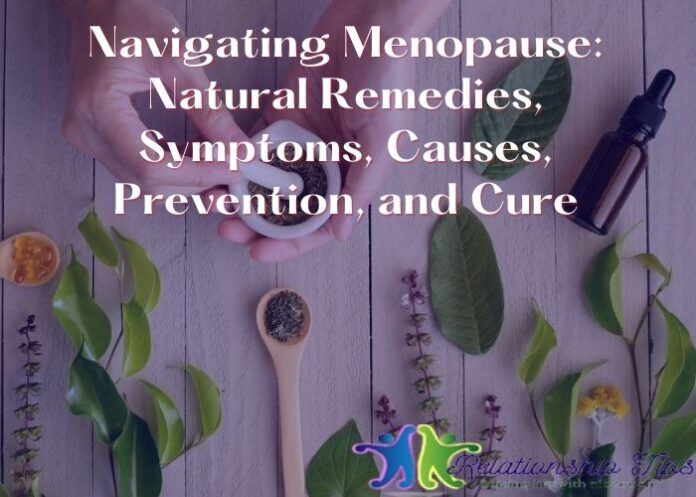Menopause is a natural phase in every woman’s life, marking the end of reproductive years. While it’s a significant milestone, the symptoms and challenges that accompany menopause can be overwhelming.
Thankfully, there are a plethora of natural remedies, preventive measures, and ways to manage the symptoms that come with this transition. In this article, we’ll delve into the symptoms, causes, prevention strategies, and potential cures for menopause, with a focus on holistic and natural approaches.
In This Article
Understanding Menopause: Symptoms and Causes
Menopause is a natural biological process that signifies the cessation of menstrual cycles and fertility in women. It typically occurs between the ages of 45 and 55, with the average age being around 51. As the ovaries produce fewer hormones, such as estrogen and progesterone, women experience a range of physical and emotional symptoms.
Common Symptoms of Menopause
- Hot Flashes and Night Sweats: Sudden waves of heat and sweating, often interrupting sleep.
- Mood Swings: Hormonal fluctuations can lead to irritability, anxiety, and even depression.
- Vaginal Dryness: Decreased estrogen levels can cause vaginal dryness, leading to discomfort and pain during intercourse.
- Sleep Disturbances: Insomnia or disrupted sleep patterns are common during menopause.
- Weight Gain: Changes in metabolism and hormonal balance can contribute to weight gain, especially around the abdomen.
- Bone Health: Decreased estrogen levels also impact bone density, increasing the risk of osteoporosis.
Causes of Menopause
Menopause is primarily caused by the natural decline of reproductive hormones. However, certain factors can influence the timing of menopause, including genetics, smoking, certain medical treatments (like chemotherapy), and surgeries that remove the ovaries.
Natural Remedies for Menopause
While menopause is an inevitable biological process, there are several natural remedies that can help alleviate its symptoms and enhance overall well-being.
1. Herbal Supplements
- Black Cohosh: Known for its potential to reduce hot flashes and improve mood.
- Sage: Often used to manage excessive sweating and hot flashes.
- Red Clover: Contains compounds similar to estrogen and may help with menopausal symptoms.
2. Healthy Diet
Focus on a balanced diet rich in fruits, vegetables, whole grains, and lean proteins.
Incorporate foods rich in calcium and vitamin D for bone health.
Omega-3 fatty acids found in fish can support heart and brain health.
3. Regular Exercise
Engage in moderate aerobic exercises like walking, swimming, or cycling.
Strength training helps maintain muscle mass and bone density.
4. Stress Management
Practice relaxation techniques such as meditation, deep breathing, and yoga.
Adequate sleep is crucial; establish a calming bedtime routine.
5. Acupuncture
Some women find relief from hot flashes and mood swings through acupuncture.
Prevention and Cure
Preventing menopause is not possible, but managing its impact on your life is. Here’s how:
1. Lifestyle Changes
- Quit Smoking: Smoking can trigger earlier menopause and worsen symptoms.
- Limit Alcohol and Caffeine: These can exacerbate hot flashes and mood swings.
- Maintain Healthy Weight: A healthy BMI can help manage hormonal balance and overall well-being.
2. Hormone Replacement Therapy (HRT)
HRT involves taking estrogen and, in some cases, progesterone to relieve menopausal symptoms. It’s effective but comes with potential risks and side effects. Consult a healthcare provider to make an informed decision.
3. Consult a Healthcare Provider
If your menopausal symptoms are severe and affecting your quality of life, consult a healthcare provider. They can recommend personalized treatment options based on your medical history and symptoms.
Conclusion
Menopause is a natural phase that every woman will go through. While its symptoms and challenges can be daunting, there are numerous natural remedies and lifestyle adjustments that can help manage the transition. By understanding the symptoms, causes, and potential preventive measures, you can navigate this phase with grace and minimal disruption to your daily life. Remember, every woman’s experience is unique, so consult a healthcare provider to create a tailored plan that addresses your specific needs. Embrace menopause as a new chapter and an opportunity to prioritize your well-being.





